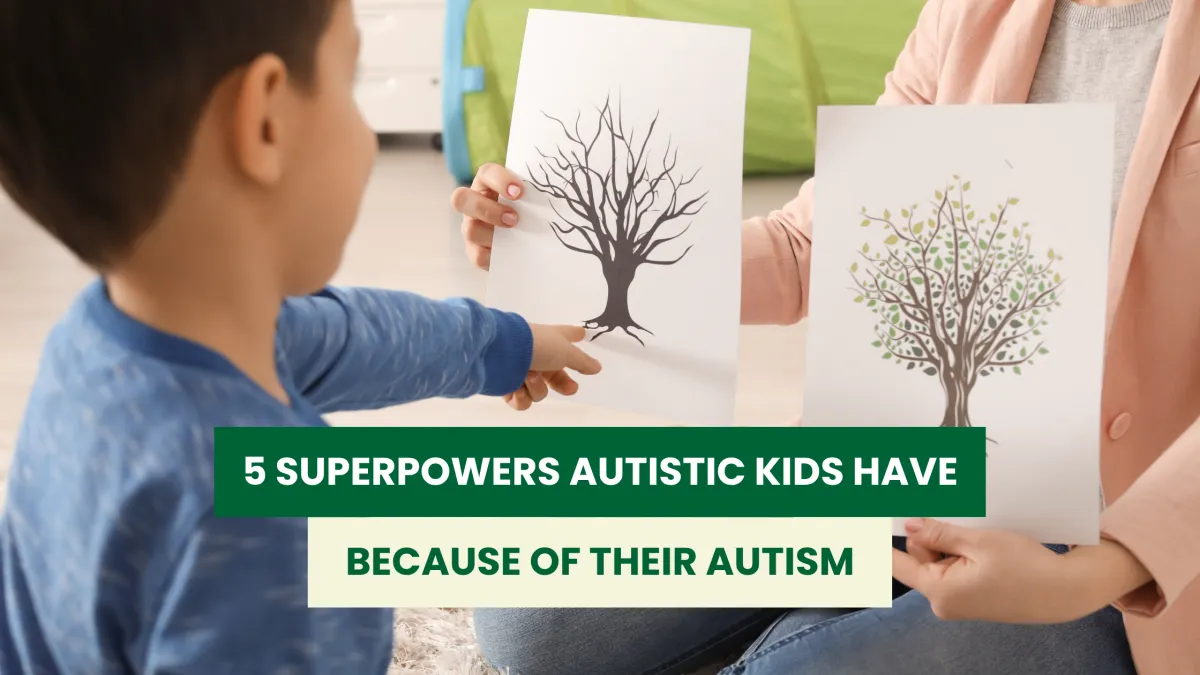
5 Superpowers Autistic Kids Have Because of Their Autism
When most people hear the word autism, they immediately think of challenges—communication difficulties, sensory sensitivities, or social differences. And while yes, autistic kids often experience life in ways that differ from their neurotypical peers, focusing only on the struggles misses a huge part of the story.
As a clinical psychologist who has worked with hundreds of autistic children and teens over the past two decades, I’ve seen something remarkable: many of the same traits that are pathologized in diagnostic criteria are also incredible superpowers when recognized, supported, and celebrated.
So today, I want to shift the lens. Let’s stop seeing autism as a list of deficits and start seeing it for what it really is—a different, powerful way of experiencing the world.
Here are 5 superpowers autistic kids have because of their autism:
1. Hyperfocus: The Power of Deep Concentration
While many kids struggle to sit still or stay on task, autistic kids often have the unique ability to hyperfocus on topics they care about. Whether it's dinosaurs, space, animation, or coding, autistic kids can dive so deeply into their interests that they often become true subject-matter experts at an early age.
Research shows that this kind of intense focus is linked to the brain’s default mode network, which may function differently in autistic individuals (Assaf et al., 2010). Rather than being a distraction, this ability to tune out the world and lock onto a single interest can lead to remarkable creativity, innovation, and expertise.
2. Exceptional Pattern Recognition
Many autistic kids have an incredible eye for patterns—whether in math, music, language, or the world around them. This pattern-seeking brain wiring helps them spot inconsistencies, recognize structures, and make connections that others might overlook.
A study published in the journal Neuron found that autistic individuals often outperform neurotypical peers on tasks involving pattern recognition and rule-based learning (Baron-Cohen et al., 2009). This ability is a strength in fields like engineering, science, coding, and design—fields that depend on recognizing how things fit together.
3. Authenticity: Radical Honesty and Integrity
One of the most beautiful qualities I’ve witnessed in my autistic clients is their radical authenticity. They aren’t usually interested in playing social games, sugarcoating the truth, or saying things they don’t mean just to fit in.
While this can sometimes come off as "blunt" in a neurotypical world that values politeness over honesty, it is actually a deep strength. Autistic kids often show a level of genuine honesty, loyalty, and integrity that is hard to find elsewhere. They are true to themselves, and when supported, they can form deep, meaningful relationships built on trust and transparency.
4. Unique Sensory Perception
While sensory sensitivities can be overwhelming, they can also be superpowers. Autistic kids often experience the world in ways that are richer, more vivid, and more detailed than their peers.
Think about artists, musicians, chefs, or designers—fields where sensory awareness is an asset. Many autistic individuals describe hearing sounds others miss, noticing textures or colors with greater intensity, or detecting patterns in music that others overlook. This heightened sensory perception can be channeled into creative and professional success when properly understood and supported (Robertson & Simmons, 2015).
5. Unique Problem-Solving Abilities
Autistic kids often have what’s called “cognitive flexibility” in unexpected ways. While they may struggle with transitions or sudden changes, they also tend to think outside the box and solve problems in creative, non-linear ways.
This makes them innovators, capable of seeing solutions that others miss because they don’t follow conventional rules. Their ability to approach challenges from unique perspectives is a strength in industries that value innovation, from technology to the arts.
Final Thoughts: Celebrate, Don’t Suppress
Autistic kids don’t need to be "fixed" or "normalized." What they need is to be understood, supported, and celebrated for the strengths they already possess. When we shift our focus from deficits to neurodiversity as a strength, we empower autistic kids to grow into the changemakers, creators, and leaders they were born to be.
If you’re raising or working with an autistic child, I encourage you to start looking for their superpowers. They are there—often hiding in plain sight.
If you found this article helpful, consider subscribing to my newsletter for more neurodiversity-affirming insights. You can also check out my clinic at Forest Psychological Clinic in Portland, Oregon for comprehensive autism evaluations and specialized support for children, teens, and young adults.
References
Assaf, M., Jagannathan, K., Calhoun, V. D., Miller, L., Stevens, M. C., Sahl, R., ... & Pearlson, G. D. (2010). Abnormal functional connectivity of default mode sub-networks in autism spectrum disorder patients. Neuroimage, 53(1), 247-256.
Baron-Cohen, S., Ashwin, E., Ashwin, C., Tavassoli, T., & Chakrabarti, B. (2009). Talent in autism: Hyper-systemizing, hyper-attention to detail and sensory hypersensitivity. Philosophical Transactions of the Royal Society B: Biological Sciences, 364(1522), 1377-1383.
Robertson, C. E., & Simmons, D. R. (2015). The sensory experiences of people with autism spectrum disorder: A qualitative study. Journal of Autism and Developmental Disorders, 45(11), 3887-3894.
